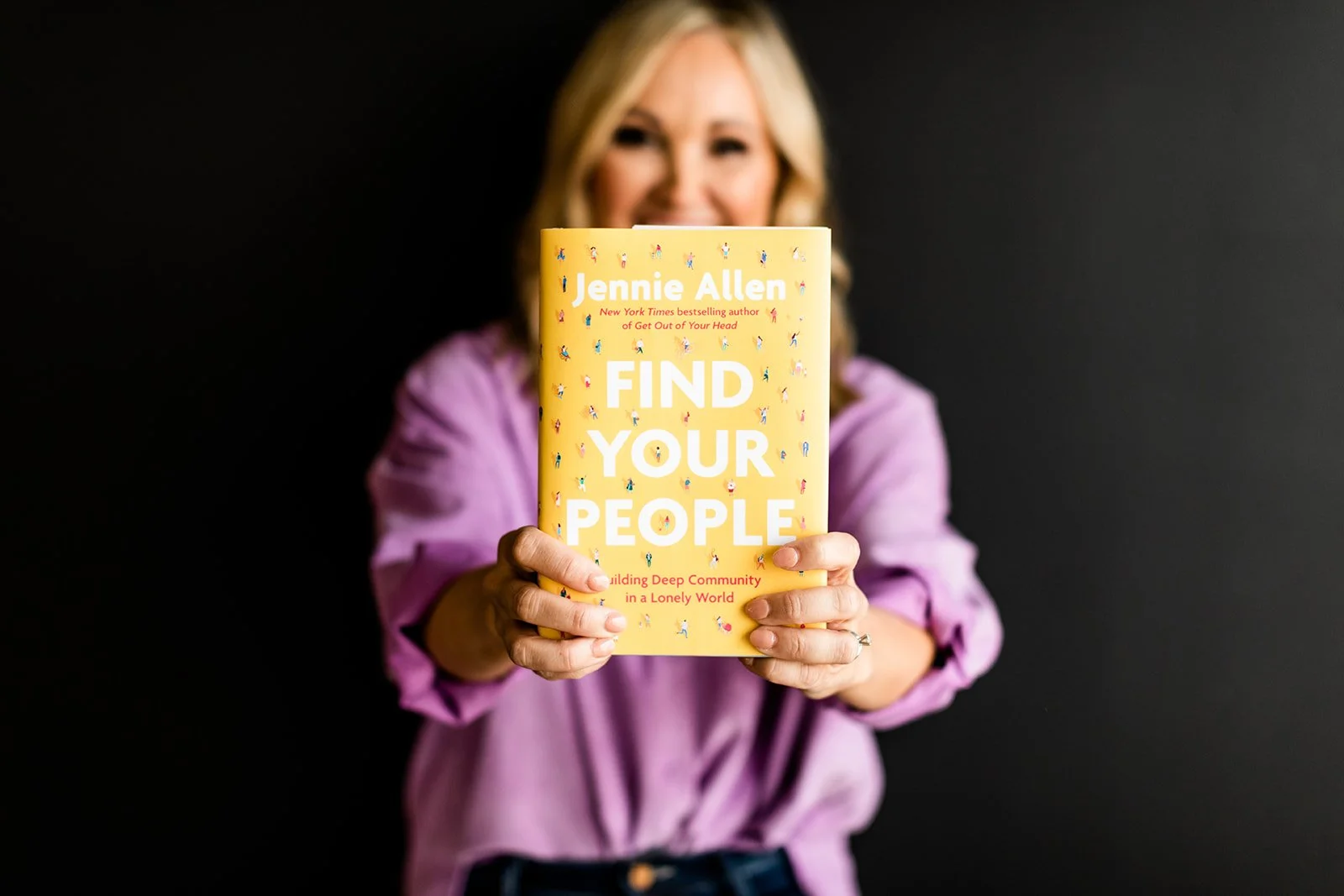The War for Your Faith with John Mark Comer
It’s time to go to war for your faith by fighting the lies you believe.
John Mark Comer’s book ‘Live No Lies’ is by far one of the best books I’ve ever read. I’m passionate about your mind, and I’m passionate that your minds are conformed to Christ.
John so casually talks about huge issues of our day, and in his book he does so in a way that is brilliant, unassuming, and humble. So, we had a chat with him about this masterpiece.
This began as a sermon series for you. Let's go into why you saw such a need for this.
John: Several years ago, I realized that very few people in my church had any intellectual or theological category for the New Testament concept of the flesh.
I grew up hearing about it in my family of origin, but I’d never heard it in my church. The overwhelming cultural current across the world is, “be true to yourself. Follow your heart. You do you. Speak your truth.”
Very deep into the Western consciousness is the idea that any form of external authority is somehow oppressive. It's seen as suffocating your true self from coming out and therefore, keeping you from being happy.
So, a thought to teach on the flesh got me thinking about the Desert Fathers and Mothers from the third and fourth century. They were basically the beginning of what we now call spiritual formation and the beginning of the contemplative tradition.
They developed a Christian kind of intellectualism and spirituality of what they called the three enemies of the soul. In their view, these were a counter-Trinity to the Father, the Son and the Holy Spirit, and they were at war with the coming of the Kingdom of God. They identify these three enemies as the world, the flesh and the devil.
This is basically a dominant Christian idea that's been almost lost in the modern Western church. With that sermon series, I wanted to take this ancient paradigm that is rich with wisdom and insight and update the language such that it makes sense to a modern Christian who's trying to figure out how to do this.
In the beginning of the book, you really go deep into the devil’s strategy. Was it scary for you to delve into the devil in that depth?
John: Yeah. It's the most difficult book I've ever written by a very wide margin. Most Christians today don't really believe in the devil unless it’s to blame him for ordinary human mishaps. Tragically, eliminating the category of the devil in the universe doesn't make the world a more loving, peaceful, unified place. Instead, you end up demonizing entire groups of people.
The book is a deep dive into one aspect of the devil that's based on the Desert Fathers and Mothers and their reading of the temptation narratives where Jesus goes into the desert. Their paradigm was what we would interpret as the practice of silence, solitude, stillness, or even contemplative prayer.
Their paradigm was that Jesus was led by the Spirit into the desert to fight Satan. The Desert Fathers and Mothers, more specifically Evagrius of Ponticus, believed that the devil's main strategy against Jesus and against us, was to plant deceptive ideas in His mind. I wanted to explore that.
There’s other stuff, ranging from demonization, natural disasters, illness, poltergeists, to other weird horrifying stuff. But, what if that's all secondary? What if the primary strategy of the enemy against us is to actually implant lies in our mind? And if so, what do we do about it?
You go into a deeper framework of those lies. What breaks down the lies?
John: In their interpretation of Jesus’s temptation in the desert, the Desert Father and Mothers note that Jesus quoted Scripture back to the devil as a form of thought redirection. God built you with a prefrontal cortex so you can't not think.
If a lie comes into your mind, whether it says you’re not worthy of love, you can't tell yourself not to think that thought. You almost give it more power if you attempt to engage the lie that way. Instead, Jesus used thought redirection to fight the devil’s lies.
The Desert Fathers and Mothers interpreted deceptive thoughts as demonic. So, you fight back by not engaging those thoughts. Instead, you redirect your mind and attention to the corresponding truth from Scripture. That's what Jesus did.
Even when Satan quoted and misinterpreted the Bible, Jesus didn’t get into a long debate with him. He redirected his thoughts. The ancients called this counter talking. This was actually a spiritual discipline that was central to their formation and prayer life. So, whenever a lie comes into your mind, you talk back, and the biggest truth is found in scripture.
We see the fruit of what everybody's believing, which is essentially that we can play God’s role in our own lives.
It's anxiety, depression, isolation and loneliness. Talk about that lie and how it has truly broken us as humans.
John: Dallas Willard once said that the human soul was built to run on God, and therefore, nothing less than God will satisfy us. Some people dispute the notion that people really have a God shaped hole in their hearts.
The reality is that people have attempted to replace the God-shaped hole in their hearts with things that are not God himself.
Politics, work, fitness, sex, sexual self-expression, sexual identity, sexual community, sexual exploration, family, and marriages have become ‘gods’ for most people.
Much of Western culture is built around the cult of the self, resulting in the need for self-validation. The tragedy of that, and the tie to massive anxiety, burnout, mental health, and loneliness is that you're attempting to be your own god.
The whole point of Christian spirituality is to free you from the prison of the self.
Christian spirituality is effectively moving off the egoic operating system, which is all about what you want and need. So, every person in front of you is either an obstacle to what you want or need, or an object of your desire. And some people never mature beyond this system.
Christianity allows us to move off the egoic operating system to agape, to become pervaded by love as defined by Jesus.
We begin our lives imprisoned by our own desire, flesh, and self in childhood. Following Jesus is about coming out of that prison into true freedom, which is the ability to want what is good, and then follow through on that desire for goodness.
One thing I realized is that we have to play offensive because there's an enemy to our soul. What does it look like to turn and fight?
John: Christ's likeness is not natural. Coming to church every other week, reading your Bible from time to time, and reading a few good Jennie Allen or John Mark Comer books won’t make you Christ-like all of a sudden.
Most of us have already been formed and discipled by the world, and it's had a far deeper impact on us than our discipleship and formation into the image of Jesus has.
We want to believe the myth that we're the captain of our own ship, and that we can self-define and self-create. But that ideology does not line up to reality. The call for us is to raise our horizon of possibility to the level of transformation that is possible in following Jesus by the Spirit and the truth of Jesus.
What is both true is that the flesh, the world, and the devil have been defeated. And they're at war for our souls.
John: The paradigm we have to recapture is that our decision is not whether or not we join this war. The question is whether or not we fight back, because we're in it whether we want to be in or not.
If you expect following Jesus to be only Sabbath, easy, and relaxing, then you're going to be spiritually neurotic.
You're going to question your faith when things don’t go your way, or when you’re not the saint you thought you’d immediately become after following Jesus.
But if you expect life to be a war with the world, the flesh, and the devil, you’ll be able to acknowledge that difficulty while also realizing that life is so deeply satisfying and joyful with Jesus.
What do you see when you look at the culture that we live in? Are you discouraged? Are you hopeful? What do you feel?
John: I'm both discouraged and encouraged. I think we're in a similar time to the Desert Fathers and Mothers. They were living through the fall of the Roman Empire. And it was a fascinating time where in the wider culture, Rome was in disarray. The culture was in a time of chaos, very similar to what we're feeling now, particularly in the last year.
The way of Jesus had gone through a major shift where for 300 years, it was a violently persecuted minority. But still millions of people became followers of Jesus, knowing it would likely cost them their life or at least their livelihood. But then there was a shift when an Emperor converted to Christianity. And suddenly, Christians could become politicians.
As many people became followers of Jesus, there was a cultural pressure to be Christian and live by a basic Christian worldview. Now the problem was not violent persecution. Rather, it was compromise and complicity with the world.
We’re in an interesting moment where outside the church, you see decline and disarray. Inside the church, you see a lot of compromise, complicity, and a litany of tragic stories of celebrity pastor scandals or churches gone wrong.
And that part of it is disheartening to me. It’s discouraging at times.
What's really encouraging to me is that as we move forward, cultural Christianity is burning up in much of the country. All what will survive is an incredibly resilient discipleship to Jesus, and people following Jesus together in a thick webbing of community living as a loving counterculture. This will be a colony of heaven, an outpost of a bastion of kingdom values, vision, and living in the here and now. And that is really beautiful.
Some of my favorite churches that I think are thriving in spiritual life are in places like Portland, New York City, London, San Francisco, these hyper secular mechas where there's full on hostility toward the way of Jesus, not just ambivalent. And that’s a great portent of what to come.
It would be foolish to not grieve some of what's happening in culture right now, which is living in almost like an act of rebellion against the God that doesn't believe in.
But at the same time, I'm full of hope.
We're part of something so ancient and the church has been through way harder stuff than this before. And each time, it has come through better. I think the church of future generations will be smaller and healthier. They’ll have the discipleship to Jesus and the church that thrives in this kind of a place. I think we're moving into a season of spiritual dry farming in the West and there's going to be maybe fewer Christians, but they could be really deep-rooted and grounded in God.
I think we're scraping and pruning away the parts that are halfhearted. You mentioned how culture has coopted the narrative of God. How do we step forward?
John: Fear is not the right emotional response. Please do not feel fear. Sobriety about our own discipleship to Jesus and our own life in church is what we need. We need to take it seriously and take the threat to our own faith’s resilience seriously. Not because we need to be scared, but because we need to be intentional and encouraged.
We need followers of Jesus who have courage moving forward. We need compassion 120%, but really, we also need some courage, resilience, and faithfulness to Jesus.
I think the future is ancient. It's returning to the core of Christian spirituality, the core of following Jesus together in community around tables where we are living with other followers of Jesus. It’s us doing life together around the way of Jesus. The future is people that take seriously their discipleship and have rebuilt an entire life architecture around practices and disciplines of Jesus, who order their whole life around prayer, scripture, and truth. People that take seriously the call to curate our consciousness, to take on the mind of Christ. People that take seriously our call to community, not just to attend church once in a while, but to live together. People that take seriously holiness, fasting, prayer, and devoting the deepest part of our body to God himself.
Jennie: We need to rebuild a world filled with that agape love and actually try to bring what God's given us and bless people around us. The Bible says we should be unified for Christ's sake, and that our unity and love for each other could change people, and help them see God.
I think the way forward is the people who love God stick together and fight to live those old things well, and to do it in the context of our villages and our cities in places God's put us. And this matters.
I’m thankful to John for making the lies clear so that we can fight them. If we don't know that it's a lie, we cannot fight it with truth.
We hope you enjoyed our conversation with John. You can listen to the full podcast at the top of this page. We love having him around, and we honestly cannot recommend his books enough. You can get a copy of his newest book here, and in bookstores near you.
Well, what are you
waiting for?
Grab your copy of
Find Your People today!




